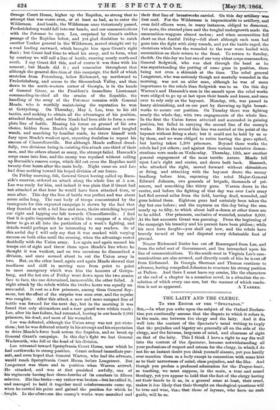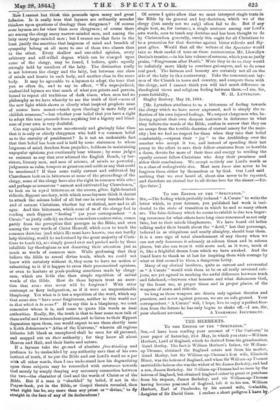THE LAITY AND THE CLERGY.
To •THE EDITOR OP THE "SPECTATOR."
Stn,—ln what you write upon the subject of the Oxford Declara- tion you continually assume that the dispute to which it refers is, in the main, one between the clergy and the laity. And it fits well into the context of the Spectator's usual writing to imply that this prejudice and bigotry are generally all on the side of the clergy, and the fairness, largeness of mind, and clearness of sight on that of the laity. This I think I have a right to say fits well into the context of the Spectator, because notwithstanding all your professions of respect and esteem for the clergy, in which I do not for an instant doubt you think yourself sincere, yet you hardly ever mention them as a body except in connection with some hint as to their narrowness of mind, class prejudice, and the like. And though you profess a profound admiration for the Prayer-book, as teaching, we must suppose, in the main, a true and sound theology, yet you appear to hold that the fact of the clergy having set their hands to it as, in a general sense at least, their creed, makes it less likely that their thought on theological questions will be true and wise, that' that those of laymen, who have no such guide, will be so. Now I cannot but think this proceeds upon many, and great fallacies. Is it really true that laymen are ordinarily sounder thinkers upon questions of theology than clergymen? Of course some laymen are far wiser than some clergymen ; of course there are among the clergy many narrow-minded men, and among the laity many large-minded men ; but I cannot see that facts in the least justify the assertion that largeness of mind and breadth of sympathy belong at all more to one of these two classes than to the other. Every shallow and one-sided opinion, every arbitrary and self-willed dogma which can be charged upon some of the clergy, may be found, I believe, quite equally strongly held by numbers of the laity. The distinction really is not between the clergy and the laity, but between one class of minds and hearts in each body, and another class in the same body. It may be agreeable to a layman to adopt the tone that you so often do, and to say in effect, "We unprejudiced, unshackled laymen see that much of what you priests and parrots, bound to repeat old traditions of dark times, when men had no philosophy as we have whereby to see the truth of God—none of the new light which shows 30 clearly what inspired prophets must of course have meant—teach upon theology is mere folly and childish nonsense"—but whether your belief that you have a right to adopt this tone proceeds from anything but a bigotry and blind- ness of your own is very doubtful.
Can any opinion be more monstrously and glaringly false than that it is only or chiefly clergymen who hold tee common belief as to the eternity of punishment? Is it not an undeniable fact that that belief has been and is held by some statesmen to whose largeness of mind, freedom from prejudice, boldness in maintaining unpopular opinions, you continually bear witness ; by some judges ES eminent as any that ever adorned the English Bench, by bar- risters, literary men, and men of science, of minds as powerful, ju.dgments as calm, tempers as generous and noble as any that could be mentioned ? If then some really earnest and cultivated lay Churchmen look on in bitterness at some of the proceedings of the clergy, some of the clergy have also the right in common with other and perhaps as numerous "earnest and cultivated lay Churchmen," to look on in equ ii bitterness at the sneers, gibes, light-hearted ridicule, flippant mockery, with which some laymen think it decent to attack the solemn belief of all but one in every hundred thou- and of earnest Christians, whether lay or clerical, now and in all ages. And this bitterness, which some of us of the clergy feel in reading such flippant ," fooling" (as your correspondent "A Curate" so justly calls it) on these tremendous controversies, comes partly from the perception that passages in the Bible, and even among the very words of Christ Himself, which seem to teach the common doctrine (and which He must have known, one can hardly help thinking, would be understood by the great majority of Chris- tians to teach it), are simply passed ov6r and pushed aside by these infallible lay theologians as not deserving their attention just as much as words of common men. While professing that they believe the Bible to reveal divine truth, which we could not know with certainty without it, they seem to have no notion of submitting to it if it happen to cross their preconceived opinions, or even to hesitate at pooh-poohing assertions made by clergy- men, which are little else than simple repetition of actual words of the Bible. How do these laymen treat an asser- tion that some sins never will be forgiven ? 'With utter contempt or fiery indignation,, as if it were an unquestionable blasphemy. Yet what is it but a repetition of the word, which say that some sins "have never forgiveness, neither in this world nor in that which is to come?" If to say this is a blasphemy, we must remember whose it is, and cease to quote His words as final authorities. Really, Sir, the truth is that to hear some men talk of these awful and tremendous questions, and to listen to their flippant dogmatism upon them, one would expect to see them shortly issue a Keith Johnstone's "Atlas of the Universe," wherein all regions hitherto left blank as unexplored shall be once for all pictured, and mapped out on their authority ; for they know all about Heaven and Hell, and their limits and nature.
If a layman take the ground of absolute free-thinking and professes to be unshackled by any authority save that of his own instinct of truth, if he put the Bible and our Lord's word on a par with all other words, then I can understand how his dogmatizing upon these subjects may be reconciled with reverence towards God merely by simply denying any necessary connection between the two—the character of God and the words of Christ or of the Bible. But if a man is "shackled" by belief, if not in the Prayer-book, yet in the Bible, or Gospel therein revealed, then what right has he, any more than any priest or "divine," to fly straight in the face of any of its declarations? Of course I quite allow that we must interpret single texts in the Bible by its general and key-doctrines, which we of the clergy (but surely not we only) often fail to do. But if any single text, as, for instance, a single sentence among our Lord's own words, seem to teach any doctrine and has been thought to do by Christendom generally, surely. this ought for all Christians to be a protection for that doctrine against bitter ridicule and flip- pant gibes. Would that all the writers of the Spectator would take as their model of tone on these controversies Mr. Llewellyn Davies's treatise,—in his late volume of sermons, which you so justly praise, "Forgiveness after Death." Were they to do so, they. would be infinitely more likely to convince gainsayers, and to do some real good. The fairness and honesty are certainly not all on the side of the laity in this controversy. Take the communicant lay- men of the Church in town and country, and compare them with the clergy, and I cannot think you will find much difference in theological views and religious feeling between them.—I am, Sir,
yours faithfully, W. H. LyrrxeToet. Hagley Rectory, May 24, 1864.
[Mr. Lyttelton attributes to us a bitterness of feeling towards the clergy which we have never expressed, and is simply the re- flection of his own injured feelings. We respect clergymen who, be- lieving against their own deepest instincts in deference to what they believe the words of the Bible, confess in sorrow that they see no escape from the terrible doctrine of eternal misery for the majo- rity; but we feel no respect for them when they take that belief comfortably,—express their " joy " to the Archbishop over the number who accept it too, and instead of spending their last penny in the effort to save their fellow-creatures from so horrible a doom, devote far more of their time and energy to reviling the equally earnest fellow-Christians who deny their premisses and abhor their conclusions. We accept entirely our Lord's words as to a class of unforgivable sins. Most men know sins never to be forgiven them either by themselves or by God. Our Lord said nothing that we ever heard of, about sins never to be repented, and therefore an eternal bar to all divine love for the sinner.—ED. Spectator.]

































 Previous page
Previous page